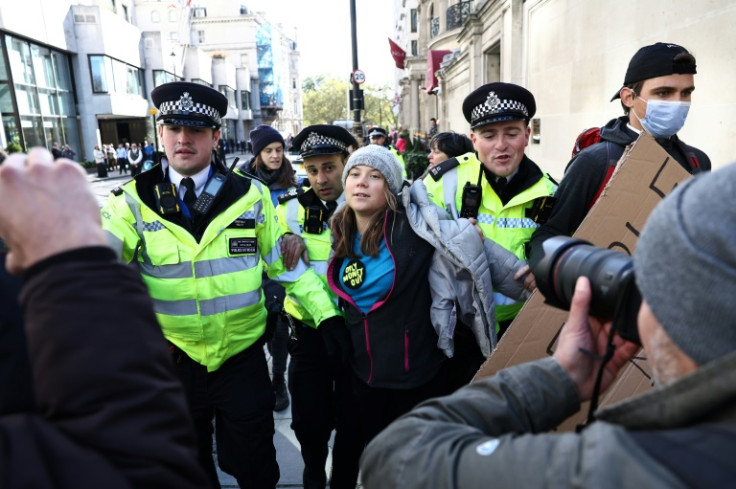Climate Activist Greta Thunberg Arrested By London Police
Thunberg was seen wearing a badge with the slogan "Oily Money Out".

Climate activist Greta Thunberg was arrested by London Police for joining protesters outside a luxury hotel where leaders from the oil and gas industry had assembled for the Energy Intelligence Forum (EIF).
The incident took place on Tuesday after hundreds of protesters blocked the entrances of the InterContinental on Park Lane.
Thunberg was seen wearing a badge with the slogan "Oily Money Out". The images and videos that have gone viral on social media platforms show Thunberg being searched and placed into a police van. The police made 20 other arrests in connection with the protests.
The protest was organised by Fossil Free London against the Energy Intelligence Forum, where the bosses of firms like Shell and Total were scheduled to speak on Tuesday.
Speaking to journalists before being arrested, Thunberg said: "Behind these closed doors at the oil and money conference, spineless politicians are making deals and compromises with lobbyists from destructive industries, like the fossil fuel industry.
"People all over the world are suffering and dying from the consequences of the climate crisis caused by these industries who we allow to meet with our politicians and have privileged access to."
Thunberg has been at the forefront of the fight against climate change for many years.
🚨 NEW: Greta Thunberg has just been detained protesting a Big Oil conference in London.
— Greenpeace UK (@GreenpeaceUK) October 17, 2023
This was her powerful message to the fossil fuel industry before she was detained.@fossilfreeLDN #OilyMoneyOut pic.twitter.com/wZAfvAvE7e
In 2018, she sat outside the Swedish parliament for days to make people aware of the threat posed by climate change. She was soon joined by thousands of students across Sweden who skipped school to protest against climate change.
She was even nominated for a Nobel Peace Prize. She has delivered rousing speeches at the EU parliament, the UN, and the UK parliament, calling on world leaders to take swift action against climate change.
Earlier this year, Thunberg said that the failure to phase out fossil fuels would prove to be a "death sentence" to millions of poor people.
Climate Activist Greta Thunberg has just been arrested again in the UK after blocking access for executives entering the Big Oil conference in London. WELL DONE @GretaThunberg! pic.twitter.com/r0uBOmoq1b
— Amee Vanderpool (@girlsreallyrule) October 17, 2023
Do we really need to worry?
It is said that Earth's average temperature will hit the 1.5ºC threshold around 2030, a decade earlier than projected only three years ago. The UN has urged the world to urgently take steps to stop global warming.
Climate change is causing record-setting temperatures to become more frequent. The UN's Intergovernmental Panel on Climate Change indicates that crossing the 1.5ºC threshold risks unleashing far more severe climate change impacts, including more frequent and severe droughts, heatwaves, and rainfall.
The planet is already 1.2°C warmer than in pre-industrial times. In order to limit global warming to 1.5ºC, greenhouse gas emissions must peak before 2025 at the latest and decline by 43 per cent by 2030.
Marine heatwaves, mass fish die-offs, wildfires, droughts, and floods have become all too common over the past few years. No country or region has remained immune from rising global temperatures.
Scientists and climate activists have been urging governments to reduce their reliance on fossil fuels such as coal, oil, and gas. These are the major sources of climate-warming greenhouse gas emissions.
According to a report by the UN's World Meteorological Organisation (WMO), two million people have been killed by extreme weather, climate, and water-related events since 1970.
"The most vulnerable communities, unfortunately, bear the brunt of weather, climate, and water-related hazards," said Prof. Petteri Taalas, the WMO's Secretary General.
Recently, Professors Johan Rockstrom of the Potsdam Institute for Climate Impact Research and David King, chair of the Centre for Climate Repair at the University of Cambridge, have said that failure to limit the temperature rise could lead to the collapse of life on the planet.
© Copyright IBTimes 2024. All rights reserved.






